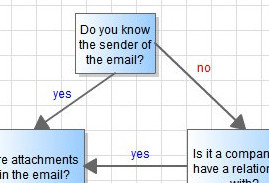Earlier this week, a group of hackers claimed to have email addresses and passwords for hundreds of millions of Apple accounts, and that it would use this information to remotely erase massive numbers of iPhones if a ransom weren’t paid. For its part, Apple says no account information was stolen from its servers. [More]
emails

Hackers Say They Will Wipe iPhones Unless Apple Pays Ransom
Hundreds of millions of iPhone owners may be up a creek next month, at least according to a hacker group that claims to have unprecedented access to the devices and is threatening to remotely wipe them clean if Apple doesn’t pay up. [More]

Spammers Must Pay $500K After Using Hacked Emails To Push Diet Pills
Last summer, federal regulators charged the operators of an alleged spam scam of hijacking hacked email accounts to spread the word about a slew of unproven weight-loss products. Now, the three affiliate marketers have agreed to pay $500,000 to put the case behind them. [More]

Monsanto May Have Ghostwritten Parts Of Reports Concluding That Roundup Is Safe
Glyphosate, the main chemical in the weed-killer Roundup, is one of the most popular herbicides on the planet, but newly unsealed court documents suggest that Roundup’s manufacturer, Monsanto, may have written at least some of an academic research paper used to demonstrate glyphosate’s safety. [More]

House Passes Bill Requiring Warrants For Searching Older Emails
The House of Representatives has unanimously passed a second attempt at new legislation that would update existing federal laws to require that law enforcement obtain a warrant in order to remotely search files that are older than six months. [More]

States Say Volkswagen Won’t Turn Over Documents In Emissions Investigation
A group of state attorneys general called out Volkswagen on Friday for allegedly withholding documents related to its use of “defeat devices” to skirt emissions standards in 500,000 vehicles in the U.S. [More]

Report: Emails Show Takata Manipulated Data On Airbags
When a slew of automakers announced last fall that they would no longer use airbag inflators from Takata, at least one cited concerns that the company had “misrepresented or manipulated test data.” Recently unearthed emails from engineers and others within the Japanese auto parts maker suggest those alleged deceptions were blatant and widely known. [More]

Comcast Is Very Concerned About Your Cocker Spaniels
David is a little confused. First, because received a Comcast bill for two months of service, even though he already submitted a payment. Second, because some denizen of Kabletown has started turning ordinary customer service e-mails in to Mad Libs. Or spell check has gone horribly awry. Or…actually, we’re not quite sure what’s going on here. [More]

BofA: Let Us Email You Disclosures Or Get The Hell Out
In a shift that can be rationalized as environmentally friendly, Bank of America is telling customers that they must agree to receive disclosures, notifications, statements and bills via e-mail if they want to continue using online banking. [More]

Watch Out For Amazon Scam Making The Rounds
The BBB says people are reporting seeing a new phishing scam going around that masquerades as an Amazon order alert. It arrives as a confirmation email with a product description, price, and Amazon logo. Naturally, if you click the provided account link to cancel the order or see whether you were actually charged for the item, the login screen you’ll be taken to won’t be Amazon. [More]

Johnson & Johnson Hired Fake Shoppers To Buy Up Bad Motrin, Avoid Public Recall
Ever since the FDA and Congress started asking Johnson & Johnson to explain why it keeps recalling medicine, there have been references to an unpublicized “recall” that happened in November 2008. Last month, at a hearing of the House Oversight and Government Reform Committee, a J&J executive swore that the company didn’t mean to mislead anyone. It turns out that wasn’t exactly accurate: Bloomberg has obtained emails from J&J’s company, McNeil Consumer Healthcare, that show executives knew the secret recall would trigger an FDA reaction if the agency got wind of its full scope. [More]

I Am Liberal And Employed, But Republicans And Job Sites Won't Stop Spamming Me
In a funny blog post, Nicole goes into a rant about how she can’t stop certain organizations from spamming her no matter what she tries, name dropping Monster.com and the Republican Party in particular. [More]

Here's A Simple Flowchart To Help Thwart Phishing Attacks
I like flowcharts because they appeal to the part of me that wants to be a robot. I also like them because they make multi-step decision paths incredibly simple to follow, even if you don’t have a lot of insight into the big picture. This flowchart from LoginHelper.com will help even your PowerPoint-slideshow-forwarding relative (yes, that one) shoot down phishers as soon as they hit the In Box. [More]

Radio Shack Celebrates Purchase Anniversary With E-mail
Brad discovered that Radio Shack is much more thoughtful than he had ever imagined. They very thoughtfully sent him an e-mail to celebrate the anniversary of his last purchase. Or maybe they’re just having problems with their e-mail notification system. [More]

H1N1 Phishing Email Making The Rounds
The Centers for Disease Control have issued a warning that there’s a new, swine flu-themed phishing email going around. It says something about an imaginary State Vaccination H1N1 Program, and asks you to create an account on the cdc.gov website–and if you click the link, malicious code may be installed on your system. Obviously you have brain worms if you fall for this. [More]

Guy Who Invented Spider Currency Wrote Fake McDonalds Memo
This will probably come as a surprise to no one, but the fake McDonalds memo that went viral last month was written by David Thorne, the same guy who tried to pay for a bill with a drawing of a spider. He is a very silly man.

Scammers Get Over-Ambitious With Fake FBI Letter
We guess if you’re gonna create a failure pile, make it a big one. This email that pretends to be from FBI director Robert S. Mueller has the typical scammy touches: strange grammatical issues, unexpected shifts between formal and casual voices, a complete lack of understanding of how US government offices actually work, and an “official” gmail address. We were ready to send our information to them until we got to the end, where the letter threatens you with arrest if you don’t play along. Now they’re just getting silly.



